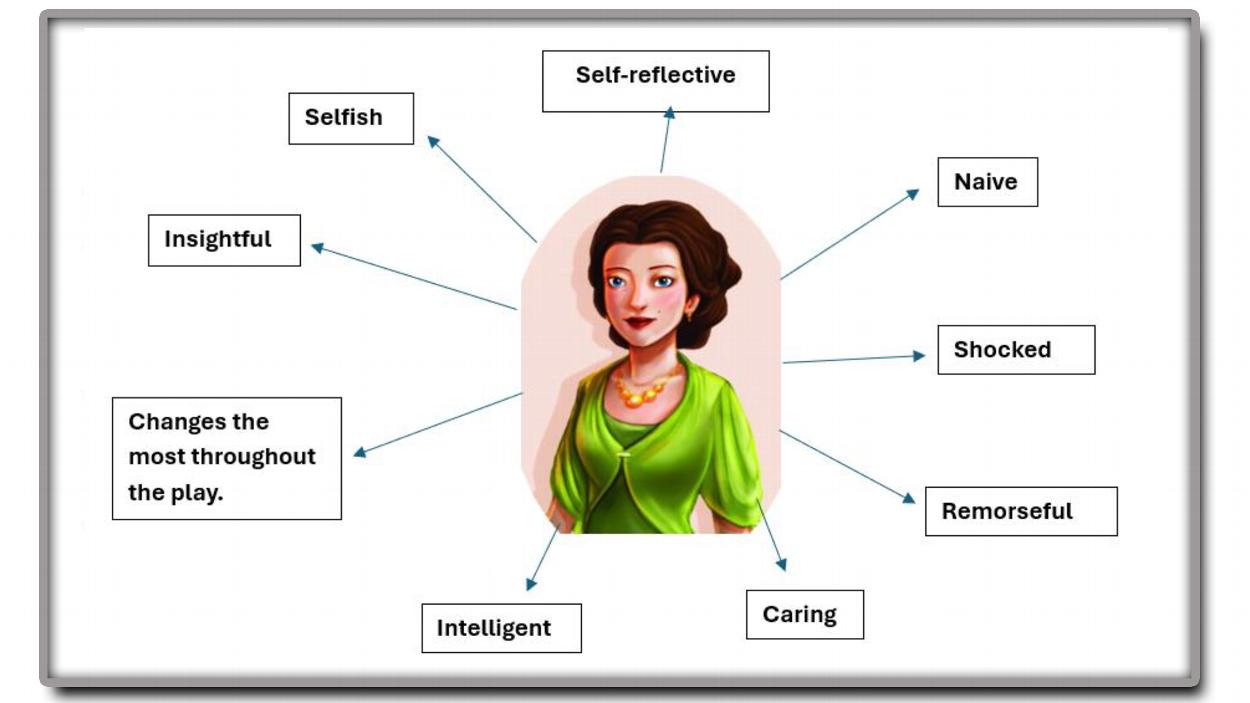
![]()
Character Analysis
Ms Sheila Birling
In this weeks Blog, we present part three of a series covering the characters of the play and the roles each one plays. This week we are looking at Ms Sheila Birling.
JB Priestley wrote An Inspector Calls to challenge inequality in society and convince his audience to support the introduction of the welfare state in Britain – a social safety net for all. He uses the characters in the play to highlight three major problems in society that he felt urgently needed to be addressed to improve life for all citizens. When analysing Sheila Birling, you must evaluate how Priestley uses his character to highlight the issues caused in society by these three problems.
The three problems were:
1. Unfettered Capitalism – an economic system of running a country with no government intervention to protect workers from exploitation.
2. A Rigid Class System – a social system which saw some members of society valued more than others simply by the family into which they were born.
3. Gender Inequality – attributing less desirable characteristics to some members of society based solely on their gender.

Sheila Birling and Unfettered Capitalism
Sheila Birling is used as Priestley's mouthpiece to directly challenge the ideas and attitudes of Mr. Birling when talking about his working practices and wage setting.
When Mr. Birling tells the inspector why he sacked Eva Smith, Sheila responds to his comments about his workers merely being ‘labour costs' by humanizing them.
“These girls aren't cheap labour - they're people.”
In this way, the audience can see that the younger generation is open to changing societal views about worker's rights and fair treatment.
Sheila Birling and the Rigid Class System
Mrs. Birling believes that women are the only ones responsible when it comes to pregnancy, and she believes that an unmarried pregnant woman should be ashamed of herself as she clearly has no moral values.
“I'm very sorry. But I think she had only herself to blame”
“She was claiming elaborate fine feelings and scruples that were simply absurd in a girl in her position.”
Sheila is shocked at the callous attitude and unfeeling behaviour of her mother and tells her in clear terms how unacceptable she feels Eva's treatment was.
“Mother, I think it was cruel and vile”
Sheila Birling acts again as Priestley's mouthpiece to highlight the terrible prejudice held by people of the higher classes towards those that they saw as socially and morally inferior.
Sheila Birling and Gender Inequality
Sheila Birling uses her power as a wealthy middle class customer to have Eva fired from the department store. She admits that she did this as she was jealous of the way that Eva looked in the dress she was trying on.
“If she'd been some miserable plain little creature, I don't suppose I'd have done it.
Sheila is horrified that her actions contributed to the eventual suicide of Eva Smith and shows deep remorse for her actions.
Priestley wanted his audience to realise that reducing women to their physical appearance and limiting their life choices to finding a good marriage causes unnecessary friction in society.
“if I could help her now, I would. ”
Sheila is expected to marry well for her future and for the future of the family – she is expected to be satisfied with the wealth and status that the marriage to Gerald Croft would bring to her and her family.
”You're just the kind of son in law I always wanted. ”
Her happiness within the marriage seems to be of little consequence to either of her parents. When it become clear that Gerald has had an affair, both parents downplay the event.
“Now, Sheila, I'm not defending him. But you must understand that a lot of young men” - Mr. Birling
“men with important work to do sometimes have to spend nearly all their time and energy on their business. You'll have to get used to that, just as I had.” - Ms. Birling
However, Sheila shows that the new generation of women want more for themselves and their lives, reflecting the suffragette movement of the early 20th century and the experience of women taking traditionally male roles in the workforce during both world wars.
“Don't interfere, please, father. Gerald knows what I mean, and you apparently don't. ” – Sheila in response to her father's defence of Gerald.
“I don't believe I will” – Sheila in response to her mother suggesting that she should accept being ignored.
Sheila is also shown to be intelligent and much more insightful than the other members of the family – she is the first to understand that the Inspector already knows everything about the family's involvement in the suicide of Eva Smith.
“Why – you fool – he knows. Of course he knows. And I hate to think how much he knows that we don't know yet. You'll see. You'll see. ”
Sheila is also the person who changes the most in the play showing that she has the strength of character to see the injustice of society, reflect on her role in this injustice and want to make changes to create a more just and equitable society for all.
In this way, Priestley shows that women are capable and clever enough to fully take part in society and should not be subjected to derogatory attitudes about their abilities.
Priestley wanted to ensure that both women and men felt empowered to make the changes in society that could be achieved through voting to enact the welfare state.

We hope you enjoyed the third part of our new Character Analysis series. We'll be continuing our look at key characters in ‘An Inspector Calls' next week.
If you want to learn more about ‘An Inspector Calls' and many other books and poetry for English GCSE, why not join one of our online tuition groups? You can find out more here.
We are also running special targeted booster sessions on Characters and Themes of ‘An Inspector Calls' on the 19th and 23rd February. You can find out more and book here.
Or you can find out about all our other courses at: Tutors for Excellence.

